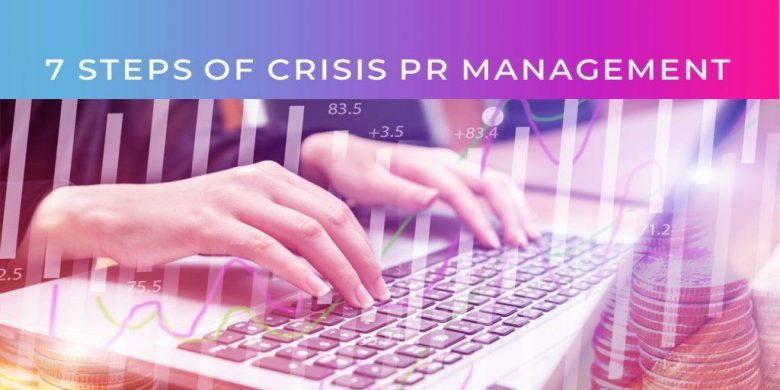
7 Steps of Crisis PR management
Crisis PR management, sometimes called crisis comms, refers to events over which you have little or no control, where there is an external agent at work such as a cyber attack, environmental disaster or a global pandemic but which has a direct impact on the stakeholders involved in your brand’s reputation and company’s performance .
Despite the lack of control, can you still proactively manage your reputation? The short answer – yes. Managing a PR crisis effectively requires you to be disciplined, agile and focused. Here is how you can manage your business reputation in a crisis:
1. Create your crisis PR plan:
Be prepared. If you have the luxury of time, the most effective way to approach this is to conduct scenario planning within your leadership team before any crisis occurs; alternatively, you will need to execute the following at pace: Brainstorm the worst crises you might have to deal with; sketch out the best and worst-case for each scenario and preferred outcomes; develop a working timeline of how events might develop and then prepare your holding statements for each given scenario. This should be a statement of fact – what has happened and your planned response over the next 24 hours.
2. Designate your crisis team:
Allocate responsibilities for each scenario, and make sure that those responsible have authority, subject matter expertise and is media savvy. They need authority because the more senior, the more credible you will appear and ideally your spokesperson should have established media relationships. In addition to the CEO, the team must include relevant experts including a crisis PR chief – all of whom must have appropriate Media skills – it is essential that all members of the team are articulate, credible, and empathetic.
3. Crisis notification:
Your team needs to be kept abreast of events as they occur – this is key in effective PR crisis management. A secure system of sharing information is essential e.g. a WhatsApp group is an ideal way of keeping people informed. Remember to keep the channel exclusive and focussed on crisis comms only – no jokes or pictures of kittens and it must always be on – a crisis is no respecter of time. Someone always needs to be on duty; make sure it’s the same person or group of people.
4. Crisis intelligence:
Facts and fiction can quickly gain traction in the media. Unfortunately, the more sensational interpretation can spread the fastest. Stories which are not managed can grow their own tentacles and be highly damaging causing panic and ridicule, adding unnecessary distress while harming your reputation. Consider who will be responsible for capturing live intelligence and from what sources; who will be responsible for sharing the information and how the intelligence will be prioritised – a traffic light system could work in this situation. Using the incoming information you need to constantly reassess and update your comms so that you adapt your messaging and responses accordingly.
5. Business champions:
In addition to your crisis comms team comprising senior management, it’s wise to identify influential individuals inside and outside the organisation whose support you will need to secure your SMART goals. Your staff, customers and supply chain. Make sure these people get accurate information and don’t forget that people under pressure won’t always get subtleties, but what ever happens you must keep all your champions abreast of any developments in the crisis PR plan.
6. Statements & Formats:
Your holding statements for each stage of the crisis will need to be updated daily to remain factually current and in tune with prevailing temperament amongst your target audiences. Remember a briefing routine is invaluable and every statement needs to be adaptable to all media channels.
7. Analysis & Learning:
In many ways we are back to point #1 above and planning for the next one. Once you have returned to a post-crisis ‘new normal’, you need to sit down with your senior leaders and consider: What went well & why? What went badly & why? What will you do differently & how? When will you institute these changes?
Join our #B2BPR tribe:
If you’ve found this article valuable, you can get more useful insight here:
Download Your Ultimate Guide to Crisis PR Management
Watch our Insight 2020 videos and discover marketers’ top challenges and strategies
Read how to adjust your comms to stay connected to your customers: Opportunity is not a dirty word
Sign up here to receive regular insights on how to make your PR work harder.
At EC-PR we are passionate about B2B communication. We believe your work is amazing and we want to help you tell the world how extraordinary it is.
CALM B2B PR Crisis Management Guide
Unforeseen circumstances can hit us all. Our guide shows you how to manage your PR in a crisis.
Subscribe to our updates
Stay up to date with the latest insights, case studies and PR guides.

How we guarantee your PR results
Turbo boost your PR today and expand your ability to reach business goals.



